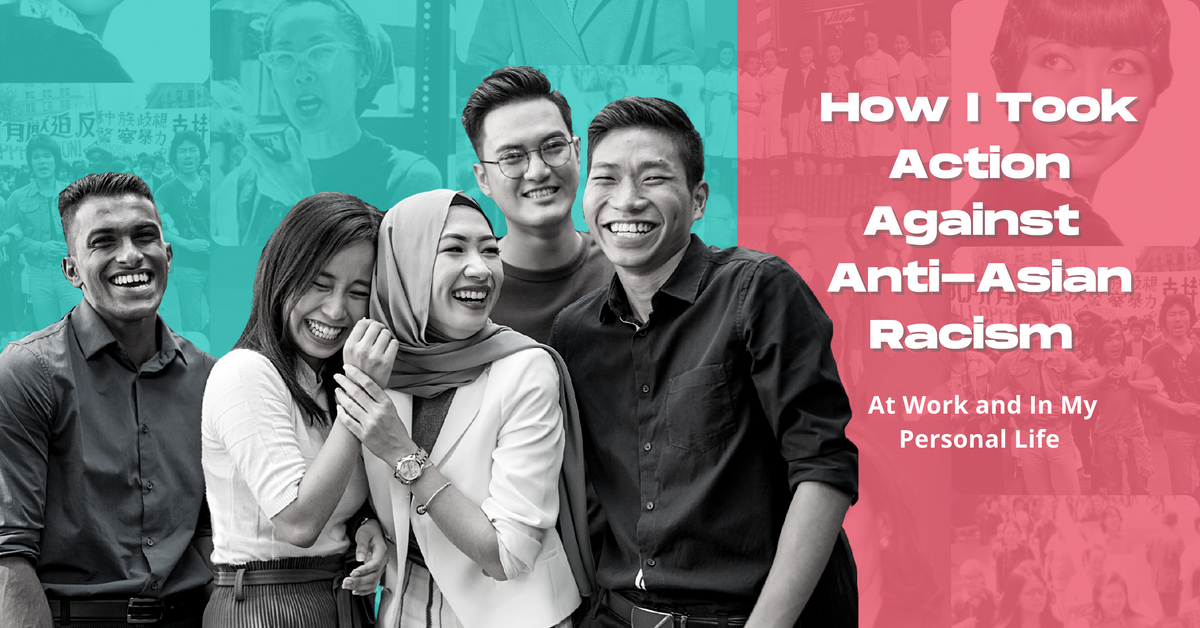If you've been paying attention to the news recently, you likely have noticed a sharp rise in Anti-Asian racism. Members of the Asian-American and Pacific Islander communities have been vocal in bringing awareness to the heightened racial discrimination they have faced since the beginning of the Covid-19 pandemic, which, in some cases, have had tragic consequences.
If you are not a member of the Asian-American community, you might feel powerless– as if you have no say in the matter. It's easy to believe that your actions aren't effective and cannot lend support to your colleagues and friends from the Asian-American community. But that is not the case– in reality, there are a number of actions you can take against Asian hate that can have real impact, in both your professional and personal life.
Acknowledge the problem
Firstly, and perhaps most importantly, you should recognize that anti-Asian discrimination is a real problem, and that its effects are on par with some of the more visible forms of racism in America. There is a long history of anti-Asian discrimination in the US, dating back more than a century, and this has recently been heightened by the irresponsible comments of some politicians.
Nevertheless, many people are still in denial. Some commentators– even in the mainstream media– continue to perpetrate the Model Minority Myth, which points to the fact that Asian-Americans are wealthier than other minorities, and use it as evidence that they do not experience racism. Further, when businesses focus on diversifying their customer base, they often make the same kind of assumption– that in order to appeal to Asian-Americans, they must target a number of dated and dangerous stereotypes. Perhaps the biggest stereotype that Asian-Americans must contend with is the idea that they are inherently foreign and not American.
The reality is that anti-Asian discrimination is very real. Stop AAPI Hate, a national coalition documenting and addressing anti-Asian discrimination during the pandemic, has recently released sobering reports on discrimination and hate in the community. The organization said it received 3,795 self reports of anti-Asian hate incidents between March 2020 and March 2021. Women are more likely to be targeted and accounted for 68% of the reports, versus 29% for men.
Recognizing and combating anti-Asian racism is a key part of spreading and practicing anti-racism.
Check in and offer support
One of the simplest, and yet most effective, ways of combating anti-Asian discrimination is checking in with colleagues and friends who might be experiencing it. Showing that you are aware of what is happening in the news and showing your support for anti-racism campaigns can help your Asian-American colleagues feel supported and empowered.
This does not mean, however, that you should identify all of the Asian-Americans in your workplace and send them an email about the latest instance of anti-Asian discrimination. Similarly, asking colleagues open-ended questions such as "how are you feeling?" or "is there anything I can do for you?" can create more stress, because the person you are asking can feel unwarranted pressure to respond.
Instead, take a look at some of the materials on how to promote inclusion in the workplace. Most guides to creating a truly open and inclusive workplace stress that it's important that staff– of all ethnic and racial backgrounds and groups– be regularly educated about the impact of discrimination in the workplace around all minorities, Asian-Americans included. Often, the best thing you can do is to spend some time reading about the subject or enroll in a course that will help you understand these complex issues.
If you are a manager, you can take this one step further, and make sure that all of your employees are aware of these issues surrounding racism and discrimination.
Taking action
If you are ready to take more direct action, a good place to start is your workplace. Stop AAPI Hate, in the aforementioned report, found that, in the last year, workplaces have been the primary sites of discrimination, accounting for 35.4% of logged hate incidents; 25.3% of reported incidents took place in public streets, followed by 9.8% that occurred in public parks.
First and foremost, this highlights the importance of reporting any anti-Asian incidents through the channels available to you, and making sure they are followed up by your employer. In order to do this, it can be helpful to review the literature on the differences between "incidents of bias" and "hate crimes". Knowing the nomenclature, and how to express yourself clearly, can make all the difference when it comes to reporting racially fueled incidents.
Depending on the industry you work in, it might also be possible to look at some systemic issues. Most industries exhibit some form of bias when it comes to hiring practices, and some are particularly reticent when hiring Asian-Americans. Even where this group is over-represented, in the Fintech industry for example, diversity issues remain, such as the fact that Fintech lags behind in female representation, and this disproportionately affects Asian-American women.
If you are in a position where you are hiring staff, it is therefore possible to shepherd your industry in the right direction by putting monitoring and direct action tools in place to improve the racial and gender mix in your own organization.
Donate to the cause
Another great way to help Asian-American communities is to donate to organizations that directly support them. This is a fast and simple way to make a real difference, and there are many ways to do it– this list from New York magazine shares more than sixty ways to donate in support of Asian communities.
Many of these groups are focused on advocacy for Asian-Americans, and will help those directly impacted by discrimination. In recent years, given the trends in the types of discrimination the community faces, there has also been a focus on supporting women within the Asian-American community. If you feel the same, organizations such as the National Asian Pacific American Women's Forum can be a good place to get information on further ways you can help.
It's not necessary to make a charitable donation to support the community– supporting business run or owned by Asian-Americans can also make a huge difference. Multiple research studies have shown that, nationwide, Chinatown businesses have been hit disproportionately hard during the pandemic– between decreased foot traffic and rising xenophobia, they are greatly suffering. So the next time you go grocery shopping, consider passing through your local Asian supermarket.
Look to the future
Ultimately, building racial justice in America is not going to happen overnight. Instead, it will require sustained work by many communities and individuals. The first step is to recognize the problem and to seek more information about it.
That's why civil rights activist and Rise founder Amanda Nguyen has argued that greater education about the experiences of Asians in America is crucial to bridging the gaps to end anti-Asian racism.
Nguyen has said that, often the most effective step in combating racism is to start from home. "Turn on your computer and find out more information about the AAPI community and listen to the grassroots organizers on the ground," she says, and you'll be taking this important first step.




